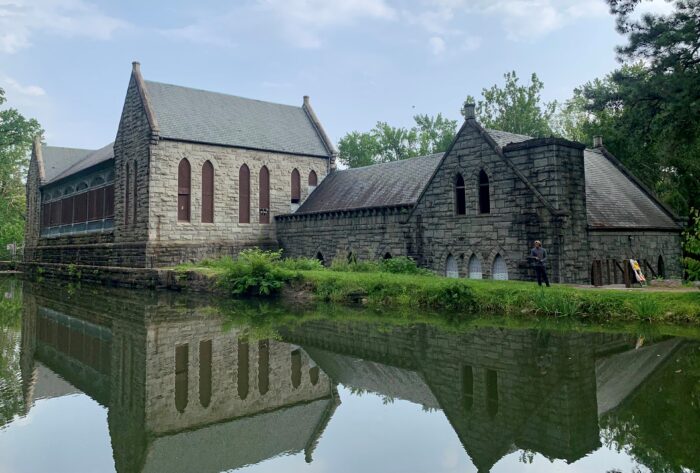
The restoration of the 19th century Pump House has been hindered by Enrichmond’s collapse. (Charlotte Matherly photo)
When the Enrichmond Foundation dissolved last June, dozens of community groups were left penniless.
A year later, several of these organizations have raised back the money that they were unable to access in their accounts at Enrichmond, which acted as a fiduciary sponsor, handling accounting, insurance, donations and more.
The Enrichmond Accountability Project, formed by several previous Enrichmond partner groups, estimates a total between $250,000 and $500,000 went missing. The FBI and Virginia’s attorney general’s office are investigating the foundation’s collapse. Several group leaders said that while they haven’t ruled it out, they don’t have high hopes of seeing that money again.
Even so, many groups have dug up various means to survive – some underwent the process of becoming a 501(c)(3) nonprofit on their own, while others found a new fiscal sponsor or obtained donations from the community to keep them afloat.
Richmond Tree Stewards
Richmond Tree Stewards is among the dozens of community organizations left in limbo when Enrichmond dissolved. It trains and deploys volunteers who plant and maintain trees around the city, raise public awareness and participate in community education programs.
Richmond Tree Stewards lost all of its money – nearly $29,000 – when Enrichmond collapsed. Dave Pohlmann, the Tree Stewards’ president, said Enrichmond had an all-or-nothing policy that required organizations to store all their funds with the nonprofit.
With that money, Pohlmann said, Richmond Tree Stewards had planned a 2,000-tree giveaway, developments on its website and the purchase of materials for its tree stewardship classes.
“I called the board back together and we were kind of looking at each other … going, ‘OK, we need to take a vote. Are we going to stay in business, or are we going to fold?’” Pohlmann said of his group’s discussions after Enrichmond’s sudden dissolution last year. “At that point, we had absolutely no funds. We were bankrupt.”
Right before Enrichmond’s fall, Richmond Tree Stewards had received a $15,000 donation but hadn’t yet processed it through the now-defunct nonprofit. That money kept them afloat, Pohlmann said, and the Tree Stewards met all of its obligations with the help of many other donors. Pohlmann wouldn’t share how many people had given money to the group.
The organization formed a board committee to spearhead fundraising efforts and set up a donation function on its website. Now, Pohlmann said, they’re in better shape than before last year’s fiasco. He didn’t disclose how much money the organization has now.
And Richmond Tree Stewards has since gone the route of becoming a nonprofit. At Pohlmann’s insistence, it reclassified as a 501(c)(3) nonprofit organization in October to avoid another Enrichmond situation down the road.
“We would not go looking for another fiscal sponsor to replace the one that basically betrayed us,” Pohlmann said. “That was my feeling of, ‘OK, fool me once, shame on you. But you will not do it twice.’ I am not putting money on deposit with somebody else again.”
Friends of Pump House
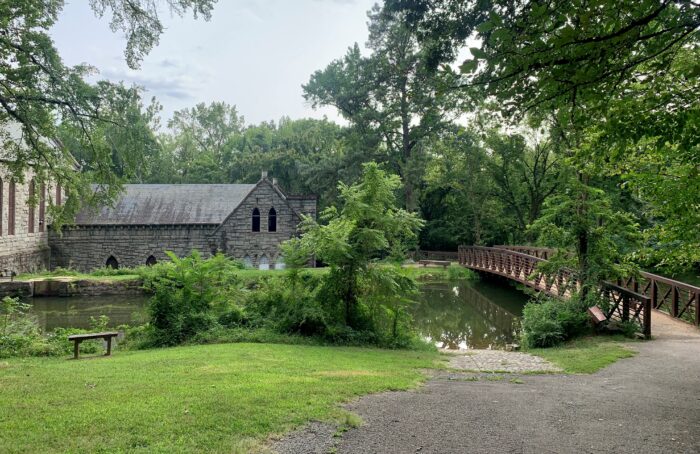
The next step for Friends of Pump House is to restore the windows in the house’s boiler room (Charlotte Matherly photo)
Friends of Pump House, a community organization working to restore Richmond’s historic Pump House and the surrounding park for public use, lost about $36,000. The 19th-century building, located on the James River and Kanawha Canal, held a water-powered pumping station and hosted high-end events and dances through the mid-1920s, according to the group’s website.
Mac Wood, the group’s secretary, said even before Enrichmond’s collapse, it was in the process of switching to another fiscal sponsor. He said he wanted to move their funds over to Friends of James River Park, which sponsors multiple community park groups.
“[It] just makes a little bit more sense because they’re more involved with the park system directly,” Wood said. “They were willing to offer us more transparency and give us an easier time actually accessing our funds.”
It took Friends of Pump House about six months after Enrichmond dissolved to get set up with Friends of James River Park, where Wood said they got their insurance back. Until they got under that “umbrella,” he said, they weren’t able to resume work.
“We were basically floating in space,” Wood said.
Nowadays, the project is back on track. Friends of Pump House has fundraised about $30,000 in the past year, bringing it back on steady financial footing. Wood said they’ve done this by hosting fundraising events and monthly tours at the Pump House as well as accruing donations from individuals.
The group’s next step is to restore the windows in the house’s boiler room, the first in a list of several other projects, like building an ADA-accessible ramp and fixing the roof.
Wood said Friends of Pump House plans to apply for a grant from the Richmond Outdoor and Prosperity Fund, a new grant charged with dispensing $250,000 from the City of Richmond to the more than 80 community organizations that were impacted by the collapse of Enrichmond.
He said each group is limited to $10,000 from the fund, which was scheduled to open grant applications Aug. 1 but has been delayed to September, according to WRIC. Wood said Friends of Pump House will continue conversations with the city administration in an effort to obtain more funding to regain as much of the $36,000 it lost as possible.
Friends of Scuffletown Park
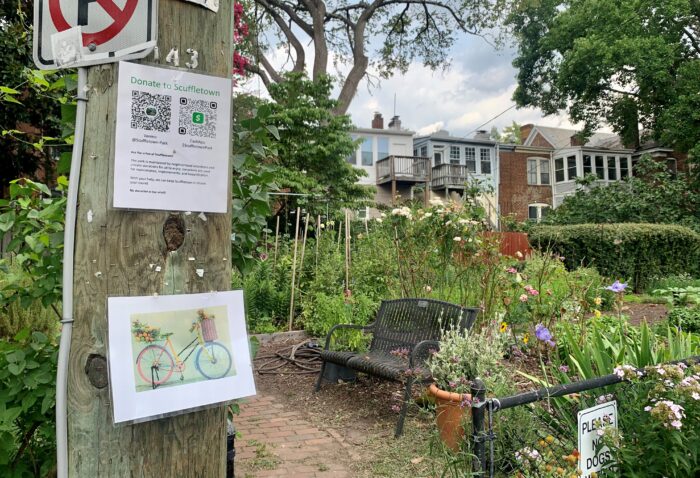
Scuffletown Park is in the Fan tucked between North Stafford Avenue and Strawberry Street. (Charlotte Matherly photo)
Several volunteer park upkeep groups were also left high and dry when Enrichmond ceased operations, including Friends of Scuffletown Park.
While the park on Strawberry Street in the Fan is maintained by the city, the group’s president, Clay Dye, said he and the other volunteers want to keep it at a certain level.
Dye said Friends of Scuffletown Park was a long-term member of Enrichmond and lost $5,000 when it collapsed.
Like Richmond Tree Stewards, Dye said they had a small cash haul they’d raised from a plant sale shortly before Enrichmond’s demise that they hadn’t yet deposited. That provided a cushion to pay for irrigation and other basic needs.
In the meantime, Dye said Friends of Scuffletown Park has raised more than $5,000 back, largely from donors who live in the Fan and the surrounding area.
The group also plans to apply for a grant from the city, which Dye said would be used to repair the park’s fence.
“[We] hope to maintain what we can but, you know, if we aren’t able to secure funding … there’ll be limited things that we can do as far as maintaining it at the level that it is right now,” Dye said. “It’s an ongoing community project.”
Moving forward
Other park groups – not including Scuffletown – made the leap to Verdant Richmond.
The local nonprofit opened its doors and became a fiscal agent for community gardens when Enrichmond dissolved.
Per city regulations, community gardens must have an insurance policy in order to exist, so many of them needed someone to buy those policies immediately. Verdant Richmond, headed by president Lawrence Miller, “restores and advocates for the city’s green spaces,” according to its website.
Ten groups are currently signed with Verdant Richmond, Miller said, with four more on the way in the coming weeks. It acts as the groups’ accountant and keeps their insurance policies up to date.
Miller funded his nonprofit himself the first few years with a limited budget, around a couple thousand dollars annually. In the year since Enrichmond’s collapse left many community garden groups out in the cold, he said his group’s revenue has increased tenfold – the organizations he serves have raised nearly $30,000.
Having spent the past six years running the nonprofit and donating his time and money to put more greenery in Richmond, Miller said he feels a connection with the groups that were affected when Enrichmond crumbled. Rebuilding trust has been an uphill climb, a job he said he takes seriously.
Verdant Richmond runs on a much smaller scale than Enrichmond, Miller said, and it doesn’t collect any percentage of donations or grants that the groups receive. It also has measures in place to keep everything aboveboard.
“[I] take my responsibility as a fiduciary very seriously – the money raised by the garden groups is theirs to keep … and spend as they choose,” Miller wrote in an email to BizSense. “We have strict firewalls set up between the groups and an explicit prohibition of Verdant Richmond loaning money raised by one group to another.”
Miller said Verdant Richmond also has an unaffiliated accountant review its books every month to check that funds are properly allocated and the numbers in the books match the checking account.

The restoration of the 19th century Pump House has been hindered by Enrichmond’s collapse. (Charlotte Matherly photo)
When the Enrichmond Foundation dissolved last June, dozens of community groups were left penniless.
A year later, several of these organizations have raised back the money that they were unable to access in their accounts at Enrichmond, which acted as a fiduciary sponsor, handling accounting, insurance, donations and more.
The Enrichmond Accountability Project, formed by several previous Enrichmond partner groups, estimates a total between $250,000 and $500,000 went missing. The FBI and Virginia’s attorney general’s office are investigating the foundation’s collapse. Several group leaders said that while they haven’t ruled it out, they don’t have high hopes of seeing that money again.
Even so, many groups have dug up various means to survive – some underwent the process of becoming a 501(c)(3) nonprofit on their own, while others found a new fiscal sponsor or obtained donations from the community to keep them afloat.
Richmond Tree Stewards
Richmond Tree Stewards is among the dozens of community organizations left in limbo when Enrichmond dissolved. It trains and deploys volunteers who plant and maintain trees around the city, raise public awareness and participate in community education programs.
Richmond Tree Stewards lost all of its money – nearly $29,000 – when Enrichmond collapsed. Dave Pohlmann, the Tree Stewards’ president, said Enrichmond had an all-or-nothing policy that required organizations to store all their funds with the nonprofit.
With that money, Pohlmann said, Richmond Tree Stewards had planned a 2,000-tree giveaway, developments on its website and the purchase of materials for its tree stewardship classes.
“I called the board back together and we were kind of looking at each other … going, ‘OK, we need to take a vote. Are we going to stay in business, or are we going to fold?’” Pohlmann said of his group’s discussions after Enrichmond’s sudden dissolution last year. “At that point, we had absolutely no funds. We were bankrupt.”
Right before Enrichmond’s fall, Richmond Tree Stewards had received a $15,000 donation but hadn’t yet processed it through the now-defunct nonprofit. That money kept them afloat, Pohlmann said, and the Tree Stewards met all of its obligations with the help of many other donors. Pohlmann wouldn’t share how many people had given money to the group.
The organization formed a board committee to spearhead fundraising efforts and set up a donation function on its website. Now, Pohlmann said, they’re in better shape than before last year’s fiasco. He didn’t disclose how much money the organization has now.
And Richmond Tree Stewards has since gone the route of becoming a nonprofit. At Pohlmann’s insistence, it reclassified as a 501(c)(3) nonprofit organization in October to avoid another Enrichmond situation down the road.
“We would not go looking for another fiscal sponsor to replace the one that basically betrayed us,” Pohlmann said. “That was my feeling of, ‘OK, fool me once, shame on you. But you will not do it twice.’ I am not putting money on deposit with somebody else again.”
Friends of Pump House

The next step for Friends of Pump House is to restore the windows in the house’s boiler room (Charlotte Matherly photo)
Friends of Pump House, a community organization working to restore Richmond’s historic Pump House and the surrounding park for public use, lost about $36,000. The 19th-century building, located on the James River and Kanawha Canal, held a water-powered pumping station and hosted high-end events and dances through the mid-1920s, according to the group’s website.
Mac Wood, the group’s secretary, said even before Enrichmond’s collapse, it was in the process of switching to another fiscal sponsor. He said he wanted to move their funds over to Friends of James River Park, which sponsors multiple community park groups.
“[It] just makes a little bit more sense because they’re more involved with the park system directly,” Wood said. “They were willing to offer us more transparency and give us an easier time actually accessing our funds.”
It took Friends of Pump House about six months after Enrichmond dissolved to get set up with Friends of James River Park, where Wood said they got their insurance back. Until they got under that “umbrella,” he said, they weren’t able to resume work.
“We were basically floating in space,” Wood said.
Nowadays, the project is back on track. Friends of Pump House has fundraised about $30,000 in the past year, bringing it back on steady financial footing. Wood said they’ve done this by hosting fundraising events and monthly tours at the Pump House as well as accruing donations from individuals.
The group’s next step is to restore the windows in the house’s boiler room, the first in a list of several other projects, like building an ADA-accessible ramp and fixing the roof.
Wood said Friends of Pump House plans to apply for a grant from the Richmond Outdoor and Prosperity Fund, a new grant charged with dispensing $250,000 from the City of Richmond to the more than 80 community organizations that were impacted by the collapse of Enrichmond.
He said each group is limited to $10,000 from the fund, which was scheduled to open grant applications Aug. 1 but has been delayed to September, according to WRIC. Wood said Friends of Pump House will continue conversations with the city administration in an effort to obtain more funding to regain as much of the $36,000 it lost as possible.
Friends of Scuffletown Park

Scuffletown Park is in the Fan tucked between North Stafford Avenue and Strawberry Street. (Charlotte Matherly photo)
Several volunteer park upkeep groups were also left high and dry when Enrichmond ceased operations, including Friends of Scuffletown Park.
While the park on Strawberry Street in the Fan is maintained by the city, the group’s president, Clay Dye, said he and the other volunteers want to keep it at a certain level.
Dye said Friends of Scuffletown Park was a long-term member of Enrichmond and lost $5,000 when it collapsed.
Like Richmond Tree Stewards, Dye said they had a small cash haul they’d raised from a plant sale shortly before Enrichmond’s demise that they hadn’t yet deposited. That provided a cushion to pay for irrigation and other basic needs.
In the meantime, Dye said Friends of Scuffletown Park has raised more than $5,000 back, largely from donors who live in the Fan and the surrounding area.
The group also plans to apply for a grant from the city, which Dye said would be used to repair the park’s fence.
“[We] hope to maintain what we can but, you know, if we aren’t able to secure funding … there’ll be limited things that we can do as far as maintaining it at the level that it is right now,” Dye said. “It’s an ongoing community project.”
Moving forward
Other park groups – not including Scuffletown – made the leap to Verdant Richmond.
The local nonprofit opened its doors and became a fiscal agent for community gardens when Enrichmond dissolved.
Per city regulations, community gardens must have an insurance policy in order to exist, so many of them needed someone to buy those policies immediately. Verdant Richmond, headed by president Lawrence Miller, “restores and advocates for the city’s green spaces,” according to its website.
Ten groups are currently signed with Verdant Richmond, Miller said, with four more on the way in the coming weeks. It acts as the groups’ accountant and keeps their insurance policies up to date.
Miller funded his nonprofit himself the first few years with a limited budget, around a couple thousand dollars annually. In the year since Enrichmond’s collapse left many community garden groups out in the cold, he said his group’s revenue has increased tenfold – the organizations he serves have raised nearly $30,000.
Having spent the past six years running the nonprofit and donating his time and money to put more greenery in Richmond, Miller said he feels a connection with the groups that were affected when Enrichmond crumbled. Rebuilding trust has been an uphill climb, a job he said he takes seriously.
Verdant Richmond runs on a much smaller scale than Enrichmond, Miller said, and it doesn’t collect any percentage of donations or grants that the groups receive. It also has measures in place to keep everything aboveboard.
“[I] take my responsibility as a fiduciary very seriously – the money raised by the garden groups is theirs to keep … and spend as they choose,” Miller wrote in an email to BizSense. “We have strict firewalls set up between the groups and an explicit prohibition of Verdant Richmond loaning money raised by one group to another.”
Miller said Verdant Richmond also has an unaffiliated accountant review its books every month to check that funds are properly allocated and the numbers in the books match the checking account.
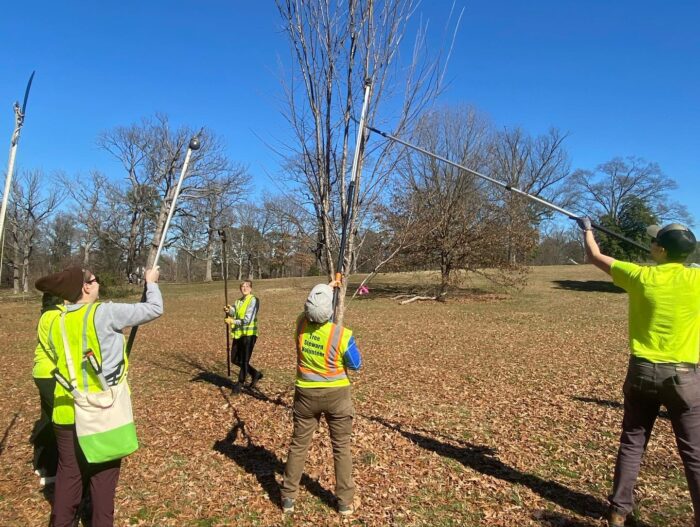
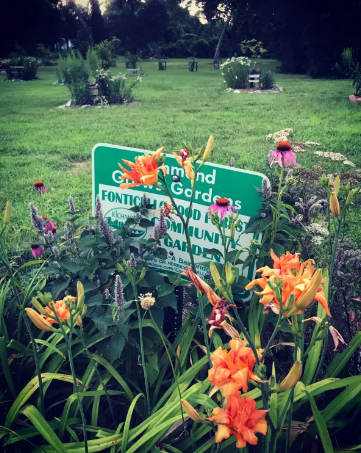
EnRichmond had policies (and regulatory laws) in place too. Those in charge ignored those policies and laws to keep the pyramid scheme going until, like all frauds of that kind, they collapsed in spectacular fashion. I think they monetary amount lost is too little to make a special on CNBC’s Greed show but I would still like to see criminal prosecution.
The proliferation of “non-profit” status has increased the grift as well. That is why I tend to volunteer time and not money.
Very true but remember most of these member organizations only used EnRichmond has a fiduciary agent. Some of them even had their own tax ID numbers. EnRichmond was just the “bank” and was not the recipient or authorized user of the funds. It would be like SunTrust is failing and it uses your account funds to keep its employees paid for a month or two before imploding.
The Richmond Outdoor and Prosperity Fund opened its grant application August 1. The application deadline is August 31. Decisions for funding will be made by the committee in September, with checks slated to be mailed to approved organizations the week after the meeting. The meeting is scheduled for late September.
I am glad the City came up with a small fund to help those organizations but that doesn’t make for 1) no warning the organizations as City admin put no money into EnRichmond in its FY21 fiscal budget as it knew something was up, 2) except for Councilmember Lynch, I have not heard a very loud condemnation from the City admin of what happened, and, 3) the administration seems to still be dragging its feet on the reclamation of the Evergreen and East End cemeteries.